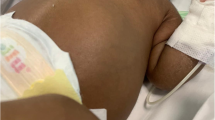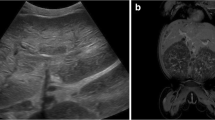Abstract
There are no clinical guidelines for performing nephrectomy in patients with autosomal recessive polycystic kidney disease (ARPKD). Few reports have described the clinical course of ARPKD diagnosed in the neonatal period in detail. Here, we report seven patients diagnosed with ARPKD and treated at our center during the neonatal period. Two died within 48 h of life due to pulmonary hypoplasia. Of the remaining five patients, three had anuria and required for kidney replacement therapy (KRT) within one week after birth, whereas two with a milder phenotype survived without KRT. All three patients who received KRT underwent unilateral nephrectomy and peritoneal dialysis (PD) catheter placement. To prevent fluid leakage, PD was initiated 7–14 days after catheter placement. However, peritoneal leakage occurred in two patients, resulting in peritonitis and discontinuation of PD; one who required long-term hemodialysis contracted a catheter-related bloodstream infection as well as developed subdural and epidural hematomas. Meanwhile, two patients underwent a second nephrectomy within 6 weeks after birth; one developed severe persistent hypotension and neurological complications, while the other died of bacteremia that may have resulted from cholangitis diagnosed on day 67 of life. A severe clinical course, life-threatening adverse events, and severe neurological sequalae may occur in patients with ARPKD who receive KRT in neonatal period.




Similar content being viewed by others
References
Zerres K, Mücher G, Becker J, Steinkamm C, Rudnik-Schöneborn S, Heikkilä P, Rapola J, Salonen R, Germino GG, Onuchic L, Somlo S, Avner ED, Harman LA, Stockwin JM, Guay-Woodford LM. Prenatal diagnosis of autosomal recessive polycystic kidney disease (ARPKD): molecular genetics, clinical experience, and fetal morphology. Am J Med Genet. 1998;76:137–44.
Liebau MC. Early clinical management of autosomal recessive polycystic kidney disease. Pediatr Nephrol. 2021;36:3561–70.
Sweeney WE Jr, Avner ED. Diagnosis and management of childhood polycystic kidney disease. Pediatr Nephrol. 2011;26:675–92.
Guay-Woodford LM, Desmond RA. Autosomal recessive polycystic kidney disease: the clinical experience in North America. Pediatrics. 2003;111(5 Pt 1):1072–80.
Nishi K, Kamei K, Ogura M, Sato M, Ishiwa S, Shioda Y, Kiyotani C, Matsumoto K, Nozu K, Ishikura K, Ito S. Risk factors for post-nephrectomy hypotension in pediatric patients. Pediatr Nephrol. 2021;36:3699–709.
van Lieburg AF, Monnens LA. Persistent arterial hypotension after bilateral nephrectomy in a 4-month-old infant. Pediatr Nephrol. 2001;16:604–5.
Burgmaier K, Ariceta G, Bald M, Buescher AK, Burgmaier M, Erger F, Gessner M, Gokce I, Konig J, Kowalewska C, Massella L, Mastrangelo A, Mekahli D, Pape L, Patzer L, Potemkina A, Schalk G, Schild R, Shroff R, Szczepanska M, Taranta-Janusz K, Tkaczyk M, Weber LT, Wühl E, Wurm D, Wygoda S, Zagozdzon I, Dötsch J, Oh J, Schaefer F, Liebau MC, ARegPKD Consortium. Severe neurological outcomes after very early bilateral nephrectomies in patients with autosomal recessive polycystic kidney disease (ARPKD). Sci Rep. 2020;10:16025.
Sweeney WE, Gunay-Aygun M, Patil A, Avner ED. Childhood polycystic kidney disease. In: Avner ED, Harmon WE, Niaudet P, editors. Pediatric nephrology. 7th ed. Berlin: Springer; 2016. p. 1103–53.
Cole BR, Conley SB, Stapleton FB. Polycystic kidney disease in the first year of life. J Pediatr. 1987;111:693–9.
Imani PD, Carpenter JL, Bell CS, Brandt ML, Braun MC, Swartz SJ. Peritoneal dialysis catheter outcomes in infants initiating peritoneal dialysis for end-stage renal disease. BMC Nephrol. 2018;19:231.
Gautam SC, Lim J, Jaar BG. Complications associated with continuous RRT. Kidney360. 2022;3:1980–90.
Vidal E, Parolin M, Gamba P. Unilateral or bilateral early nephrectomy in infants with autosomal recessive polycystic kidney disease? Weighing risks and benefits. J Pediatr Surg. 2021;56:435–6.
Overman RE, Criss CN, Modi ZJ, Gadepalli SK. Early nephrectomy in neonates with symptomatic autosomal recessive polycystic kidney disease. J Pediatr Surg. 2021;56:328–31.
Mallett TM, O’Hagan E, McKeever KG. Early bilateral nephrectomy in infantile autosomal recessive polycystic kidney disease. BMJ Case Rep. 2015. https://doi.org/10.1136/bcr-2015-211106.
Shukla AR, Kiddoo DA, Canning DA. Unilateral nephrectomy as palliative therapy in an infant with autosomal recessive polycystic kidney disease. J Urol. 2004;172(5 Pt 1):2000–1.
Abdul Majeed N, Font-Montgomery E, Lukose L, Bryant J, Veppumthara P, Choyke PL, Turkbey IB, Heller T, Gahl WA, Gunay-Aygun M. Prospective evaluation of kidney and liver disease in autosomal recessive polycystic kidney disease-congenital hepatic fibrosis. Mol Genet Metab. 2020;131:267–76.
Rossetti S, Harris PC. Genotype-phenotype correlations in autosomal dominant and autosomal recessive polycystic kidney disease. J Am Soc Nephrol. 2007;18:1374–80.
Burgmaier K, Brinker L, Erger F, Beck BB, Benz MR, Bergmann C, Boyer O, Collard L, Dafinger C, Fila M, Kowalewska C, Lange-Sperandio B, Massella L, Mastrangelo A, Mekahli D, Miklaszewska M, Ortiz-Bruechle N, Patzer L, Prikhodina L, Ranchin B, Ranguelov N, Schild R, Seeman T, Sever L, Sikora P, Szczepanska M, Teixeira A, Thumfart J, Uetz B, Weber LT, Wühl E, Zerres K, Dötsch J, Schaefer F, Liebau MC. Refining genotype-phenotype correlations in 304 patients with autosomal recessive polycystic kidney disease and PKHD1 gene variants. Kidney int. 2021;100:650–9.
Akarkach A, Burgmaier K, Sander A, Hooman N, Sever L, Cano F, Zambrano P, Bilge I, Flynn JT, Yavascan O, Vallés PG, Munarriz RL, Patel HP, Serdaroglu E, Koch VH, Suarez ADC, Galanti M, Celedon CG, Rébori A, Kari JA, Wong CJ, Elenberg E, Rojas LF, Warady BA, Liebau MC, Schaefer F, IPPN Registry. Maintenance peritoneal dialysis in children with autosomal recessive polycystic kidney disease: a comparative cohort study of the international pediatric peritoneal dialysis network registry. Am J Kidney Dis. 2020;75:460–4.
Acknowledgements
The authors would like to thank Drs. Kandai Nozu, Naoya Morisada, and Hiroki Kurahashi for genetic testing.
Author information
Authors and Affiliations
Corresponding author
Ethics declarations
Conflict of interest
Koichi Kamei has received research funding from the Public Foundation of Vaccination Research Center, and the Taiju Life Social Welfare Foundation; donations from Chugai Pharmaceutical Co. Ltd., Teijin Pharma Ltd., Kyowa Kirin Co. Ltd., Shionogi & Co. Ltd., Daiichi Sankyo Co. Ltd., Mitsubishi Tanabe Pharma Co. Ltd, and Otsuka Pharmaceutical Co. Ltd.; and lecture fees from Terumo Co. Ltd., Baxter Ltd., and Zenyaku Kogyo Co., Ltd. Other authors have no potential conflicts of interests to disclose.
Ethical approval
The study was conducted according to the Helsinki Declaration’s principle and the Japanese Ministry of Health, Labor, and Welfare’s ethical guidelines. The study was approved by the Ethics Committee of the National Center for Child Health and Development (approval number: 2022-196).
Informed consent
Informed consent was obtained from guardians of all patients in the study.
Additional information
Publisher's Note
Springer Nature remains neutral with regard to jurisdictional claims in published maps and institutional affiliations.
About this article
Cite this article
Inoki, Y., Nishi, K., Osaka, K. et al. Complications and prognosis of patients diagnosed with autosomal recessive polycystic kidney disease in neonatal period. CEN Case Rep (2023). https://doi.org/10.1007/s13730-023-00827-1
Received:
Accepted:
Published:
DOI: https://doi.org/10.1007/s13730-023-00827-1




